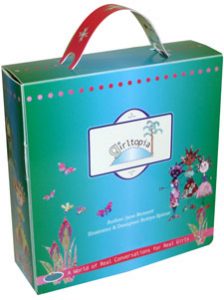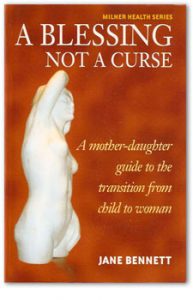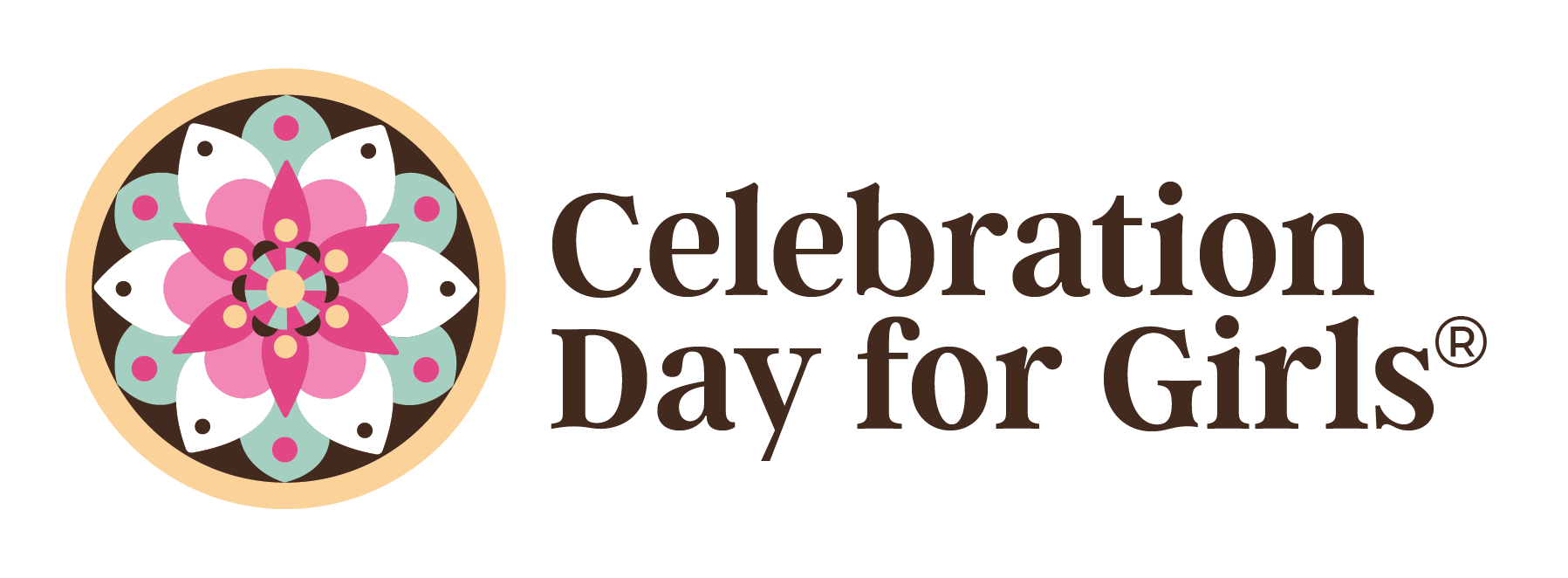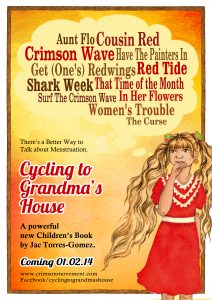The following resources will help you to offer girls healthy, practical and affirming support as they transition through puberty and start their menstrual period.
Girltopia

A World of Real Conversation for Real Girls
Girltopia is a set of 70 full-colour cards for building conversations with girls from age 10, and women of any age, produced by St Luke’s Innovative Resources―an Australian, not-for-profit publisher of high-quality resources for counsellors, educators, social workers, health professionals, teams, managers and parents.
For more information and to purchase go to janebennett.com.au
A Blessing Not a Curse
A mother-daughter guide to the transition from child to woman
 This book includes:
This book includes:
- A cultural, historical and modern day review of menstruation
- Ways to support girls through the onset of puberty, the approach of menarche and as they establish and maintain menstrual awareness
- Self-help therapies for menstrual problems – some fun and lovely things to learn and practice together
- A fascinating and enlightened explanation of the physiology of the menstrual cycle
- How to transform our cultural inheritance into one that cherishes and nourishes our female body and experience
For more information and to purchase go to janebennett.com.au
Cycling to Grandma’s House
Welcoming Womanhood
Welcoming Womanhood page promotion
The Anti-Acne Teenage Diet
If skin problems become an issue for your daughter this research and diet may provide a preferred healthy option for her.
The Teenage Anti-acne Diet is based on up-to-the-minute research about the link between diet and adolescent skin disorders. The study, the first of its kind to look at the effect of diet on acne symptoms was conducted by RMIT in collaboration with the Department of Dermatology at the Royal Childrens’ and Royal Melbourne hospitals.
Dr Neil Mann, Associate Professor of Nutritional Biochemistry at RMIT University led this groundbreaking study which showed that a Higher Protein–Low GI diet, which included lean red meat, reduced facial acne by 50 per cent after 12 weeks.
After 3 months the Higher Protein–Low GI diet was also found to reduce insulin levels, which helped to control the hormonal imbalances associated with acne, and have a positive effect on energy levels, self-esteem, confidence and overall mood.
The Teenage Anti-acne Diet booklet helps to turn the science into a practical diet and lifestyle plan that can be used alone or with anti-acne treatments to improve acne and overall quality of life.
You can download The Teenage Anti-acne Diet booklet from www.themainmeal.com.au which features a two week meal plan and a handful of recipes or call 1800 550 018 for extra copies.
Q&A: Factsheet from About Women (SBS), featuring A Celebration Day for Girls
Is menstruation still seen as a ‘curse’, something to be ashamed of and kept hidden?
Attitudes have changed considerably from a hundred years ago or so. Most people no longer think that a menstruating woman has the power to blunt knives or ruin crops!
However, there is still considerable embarrassment about menstruation in our society. Given how universal and natural the process is, it is amazing that menstrual product advertisements are still so obtuse and euphemistic: it’s only if you know what is being advertised already that you’ll know what it’s all about. This is in complete contrast to all other advertising.
Another illustration of this attitude is that many women still suffer menstrual problems in silence, either in embarrassment or because they believe that this is their lot as a woman. Similarly, menstrual problems are often treated with drugs to eliminate the natural cycle rather than offered therapies to restore hormonal health and a healthy menstrual cycle.
Why should we celebrate menarche (first period)?
Menarche is the beginning of 35-40 years of fertility and cycling. In many cultures this is celebrated as a major threshold and change of status in a girl’s life. She has new roles and new responsibilities. Her fertility is valued by her culture.
While we generally don’t value early pregnancy and mostly have small families in Western countries, our fertility is still important as an indication of our overall health and as a powerful metaphor for creativity and our interconnectedness with LIFE itself. By celebrating menarche we give a profound message to girls that this process within her body is important and valuable, and so is she, as she learns to inhabit and navigate her changing status and body through her teenage years.
Does it make a difference if a girl has a positive introduction to her periods?
The natural process of a child’s body maturing into one that is fertile and can create new life is wondrous and happens to almost every female. Girls who are taught about these changes and how and why they have periods in the context of beauty and wonder, are given a profound gift. This naturally leads to positive self-esteem, self-care and healthy decision-making around relationships.
To introduce periods in a context of embarrassment, blame or as a mechanical ‘plumbing’ kind of process gives the message that this deep, intrinsic and feminine rhythm of their body is bad, unnecessary, not important, gross or disgusting. This message can seriously undermine a girl’s sense of self-worth.
If they don’t get a positive introduction, what might happen?
Studies have shown that without a positive introduction to menstruation girls (and women) can have significantly more serious menstrual problems (pain, PMS etc), as well as self-esteem issues and a sense of isolation and shame. A positive introduction to menstruation has also been found to lead to more positive birth experiences, with less intervention, later on.
How can parents of girls approach menstruation in a positive way?
For Mums: Learn more about your own cycle – charting for a few months if you have never done it can be a great journey of discovery*, make friends with your cycle – slow down at menstruation and look after yourself. If you feel stressed and burdened before or during your period ask for help and ease up on your expectations. Continue to explore and observe your menstrual cycle with a sense of curiosity and self-discovery. This modeling will help you know how to communicate with your daughter about menstruation and the changes that are happening to her.
Go to www.fertility.com.au or Natural Fertility by Francesca Naish to find out more.
For Dads: You may not be in the hot seat regarding explaining menstruation, menstrual products and so on, but you still have a very important role to play. As you support your daughter’s transformation from your little girl into a strong and beautiful young woman, your role will change too.
Stay close, busy as you may be, and find ways to remain involved in her daily/weekly life. Affirm her strengths. If you have had a habit of expressing judgement of women (and men) based on their physical appearance now is the time to break the habit. Even if you never direct it to her these judgements can be very damaging to her sense of self-worth.
Know that you are the important man in her life, even if you are sometimes treated as ‘daggy old Dad’ or like a walking wallet. She is observing you closely and learning about relationships and men through you. While being honest about who you are and your ongoing journey, share with her about your values regarding relationships, commitment, goals etc.
For both parents: spend some time remembering your own experiences of puberty. While we’re mostly pretty comfortable in our adult body now, remember the journey you took to get here.
If a girl has heavy and painful periods or menstrual problems, how can she keep a positive attitude towards her body?
One of the amazing things about the menstrual cycle is that it can regularly give us a reading on what’s happening in our overall health. Menstruation does not equal menstrual problems. However, menstrual problems can indicate health problems, for example, issues arising from a stressed liver or nutritional deficiencies will often scream loudest at menstruation.
While it can be hard for a girl to feel positive about periods when she’s doubled up in pain, gentle, respectful and effective help can establish or re-establish a healthy menstrual cycle. This approach also offers heightened awareness about how a girl can look after herself when problems do arise. Most of us have not had modeling around how to do this so it can take a little extra effort to support our daughters in this way.
What can she do to ease her discomfort?
Each person has their own particular health profile so it is a little difficult to generalise about easing menstrual problems here. Some girls will find just slowing down and using a heat pack will be enough, others will need to follow the advice of health practitioners experienced in hormonal health. Having said that, nutrition, exercise and lifestyle certainly play a part, as can simple awareness of where she is in her cycle and tuning into what she needs to look after herself.
These books and websites have effective self-help tips and guidance about when professional help is recommended:
A Blessing Not a Curse Jane Bennett
The Pill: Are You Sure It’s for You? Jane Bennett and Alexandra Pope
Natural Fertility Francesca Naish
The Woman’s Yoga Book Bobby Clennell
What advice can you offer for parents who feel awkward discussing this?
Many parents feel awkward about discussing menstruation, and the changes of puberty and sexuality with their children. This is understandable as most of us had parents who were uncomfortable themselves. Nonetheless, while acknowledging our discomfort, our input can be of great help to our children. To get you started read, talk to other parents, acknowledge your feelings, think about what you would have liked to know or have had your parents discuss with you, seek out professional help – workshops, or one-on-one guidance. It’s okay to be embarrassed, just don’t let this stop you.
What celebrations or rituals can families have for girls at this time?
As many of us have lost touch with rituals that may have been practiced by our ancestors, we have the freedom to create some that are meaningful to us. In fact we often do practice rituals without realising that’s what we’re doing.
A simple “Congratulations!” can be very powerful and is a great deal more than most adult women received at their menarche. You may choose to celebrate with a favourite meal or cake, a dinner out, a gift or words appreciating the strengths or special qualities of your girl. In some families a camping trip with female family members and friends will be planned sometime during the following year. Flowers, candles, a special time together never go astray.
Be intuitive and respectful of the wishes of your daughter. If she is very private and needs time to adjust to her new status you could delay a celebration or keep it low key.
How can men support their daughters and wives, girlfriends and sisters?
Men benefit from learning about the processes of menstruation too. Not only will you understand more about what is happening for the women in your life, you may get some very useful tips as to how to live with cycling women. All the books listed below would be enlightening and include special tips for men.
Men understand more about menstruation than women often realise. Even if it’s not a big topic of conversation, many men spend decades of their lives living with cycling women. It may be helpful to realise that although your wife or girlfriend may have had a menstrual cycle for many years, they live in a society where they are taught to ignore this aspect of their being, often to their, and perhaps your, detriment.
To begin with, ask questions, be curious, seek to learn more. If you find regular arguments seem to be happening in your house premenstrually, know that this is probably not the time for ‘sorting things out’ as the emotional temperature may be too high. However it may be useful to know issues that arise at this time are not just because your partner is premenstrual, they are exacerbated at this time. You could say, ‘this is an important issue – let’s make a time to talk about it so we can work out something that will suit both of us.’
There are dramatic fluctuations in women’s hormonal levels throughout the menstrual cycle. This is healthy and normal, however as many women haven’t learnt, or been given permission, to understand and work with the rhythms of their cycle, the struggle against these natural fluctuations in emotional and physical energy can be problematic.
One simple tip: If you offer extra practical support and ask for less for yourself when your partner is premenstrual and/or menstrual, depending which is her more vulnerable time, and allow her the opportunity to slow down and rest, you could be amazed at the difference it makes for you both.
Useful links
More about the founder of A Celebration Day for Girls janebennett.com.au
Menstrual wellbeing for mothers & daughters jomacdonald.com
The place where girls connect & support each other while creating poetry, artwork, stories, videos, and more newmoon.com
Deepening awareness of the menstrual cycle menstruality.com.au
Addressing the barriers women & girls face around menstruation crimsonmovement.com
Presenting a new paradigm in womens’ health, including the dynamic of monthly cycling and the transition of menopause womensquest.org
Reproductive health care for every stage of life: menstrual wellbeing, contraception, preconception health care, perimenopause & menopause fertility.com.au
Hemp, organic cotton & cotton reusable cloth pads rad-pads.com.au
Take charge of your menstrual health cycleharmony.com
Advice & stories for young people about relationships lovegoodbadugly.com
For fathers of daughters & step-daughters thedadman.com
Victims of trafficking therapeutic program in Asia, including menstrual cycle awareness theart2healingproject.org

